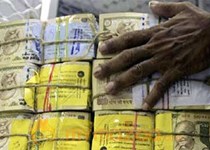Global ratings agency Moody's attributed the fall in rupee's value to widening current account deficit (CAD) and said the depreciation is likely to inflate the fuel subsidy bill, weaken the credit quality of oil companies and put pressure on the fiscal deficit.
Continuing its slide, the rupee on Tuesday breached 64-mark against the US dollar by falling 98 paise to trade at record low of 64.11 on persistent dollar demand in the early trade.
"Despite previous price liberalisation in the petroleum sector, the subsidy bill is likely to rise due to depreciation, thus widening the government's deficit, which is also under pressure from slower revenue growth", said Moody's Investors Service in an e-mail reply.
The depreciation of the rupee, it said, reflects the wider CAD as well as lower net capital inflows.
"We believe the currency will remain under pressure until the current account deficit narrows meaningfully, or capital inflows accelerate due to an improving growth outlook," Moody's said.
Meanwhile, a report by the rating agency said the rupee fall will weaken the credit quality of state-owned oil marketing and upstream oil companies during the current financial year if the government continues to ask them to share a higher fuel subsidy burden as it did in April-June.
"We now expect fuel subsidies for FY 2014 at Rs 1.4-1.5 lakh crore, up from the Rs 1.3 lakh crore expected in June 2013," said Vikas Halan, Moody's Vice President and Senior Analyst.
The report cites the ongoing depreciation of the Indian rupee and the rising crude oil prices as the reasons for the upward revision of its fuel subsidy estimate for 2013-14.
"If the government continues with the same subsidy-sharing formula, as in April-June quarter, then the credit quality of the state-owned oil companies will weaken further," Halan added.
State-owned oil marketing companies Indian Oil Corporation (IOC), Bharat Petroleum Corporation Limited (BPCL) and the upstream Oil and Natural Gas Corporation (ONGC) reported weak results for the April-June quarter.
However, on a normalized basis - after excluding the effects of the fuel subsidies and foreign exchange losses - EBITDA for both IOC and BPCL improved from a year ago, owing to higher gross refining margins and marginally higher sales volume.
According to Moody's, "the total fuel subsidies actually declined in April-June 2013, the first quarter of 2013-14, but because of the way the burden is shared out, the portion borne by the marketing and upstream companies rose overall, while that by the government fell."
The decline in fuel subsidy initially was on account of lower crude oil prices and reforms in domestic diesel prices.







